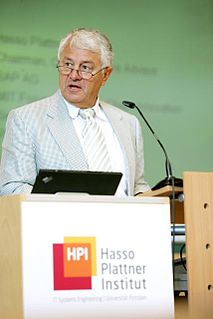A Quote by Bill Gates
Software was the key element that would determine how useable and how broadly applicable the machine was.
Related Quotes
Anything that we know how we do, machines will do better. Now, the key element of this phrase is, "We know how we do it." Because we do many things without knowing exactly how we do them. So this is the area where machines are vulnerable, because it still has to learn from some kind of experience. It needs something - at least the rules of the game. You have to bring in something that will help the machine to start learning. It's like square one. If there's nothing there, if you can't explain it, that's a problem.
Testing by itself does not improve software quality. Test results are an indicator of quality, but in and of themselves, they don't improve it. Trying to improve software quality by increasing the amount of testing is like trying to lose weight by weighing yourself more often. What you eat before you step onto the scale determines how much you will weigh, and the software development techniques you use determine how many errors testing will find. If you want to lose weight, don't buy a new scale; change your diet. If you want to improve your software, don't test more; develop better.
On a strategic level, employers really are behaving stupidly. Look at how they do recruiting: this automated process under which they will publish a job description chock full of so-called "key words", and then have software algorithms that attempt to match applicants to the resumes against those key words. So where in the key word collection do we capture institutional knowledge? No one advertises for that. Of course they don't.
There is, however, one feature that I would like to suggest should be incorporated in the machines, and that is a 'random element.' Each machine should be supplied with a tape bearing a random series of figures, e.g., 0 and 1 in equal quantities, and this series of figures should be used in the choices made by the machine. This would result in the behaviour of the machine not being by any means completely determined by the experiences to which it was subjected, and would have some valuable uses when one was experimenting with it.
I think you have to find how the machine can work for you. That's what I mean by "attaching yourself to the machine," 'cause the machine is going to be there, and you can rage against the machine, which is cool, but there's ways that you can benefit off the machine if you're savvy enough and you're sharp enough, smart enough. We all got to live and eat.




































